By Robert St. Martin
West Los Angeles, CA (The Hollywood Times) 03/29/2024
Alice Rohrwacher has been a filmmaker to watch and her latest film La Chimera (Italy/Switzerland, 2023) is a fine example of her oblique approach to narrative. Like her other films, La Chimera is a complex viewing experience with this inventive film, mixing film stocks and aspect ratios and moving fluidly between dream logic and reality. La Chimera was included in American Film Institute Film Festival (AFI FEST) in November 2023 and just opened at the Landmark Nuart Theatre in West L.A. today.

The film stars Josh O’Connor (from The Crown) as Arthur, an Englishman in Italy who is part of a group who make money locating, digging up, and plundering ancient Etruscan tombs. The group then sells the antiquities to a mysterious figure named Spartaco (actress Alba Rohrwacher) who, in turn, sells them on the black market to art dealers.
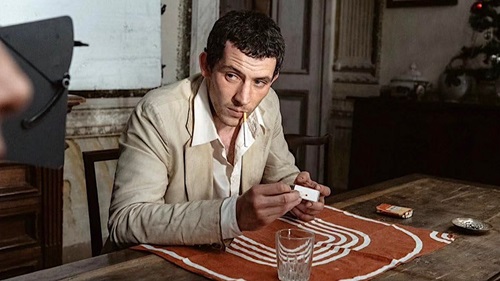
Josh O’Connor is the melancholic grave-robber Arthur who comes to see the mother of his former girlfriend Benjamina, who seems to have disappeared long before the story begins. Arthur’s past relationship to Benjamina (Yile Vianello), Flora’s daughter. Beniamina is only glimpsed in a series of wistful flashbacks – and they’re so dreamy that one wonders if the woman was ever real. Flora (played by Isabelle Rossellini), the wheelchair-using mother of the love of his life, lives in a crumbling Tuscan manor and awaits the return of her daughter Benjamina and has to deal with her other four remaining daughters who want her to sell the property and move into a rest home. The humor is offbeat (in the opening minutes, Arthur socks a sock salesman on a train, and there’s a late set piece involving an art sale at sea that might as well have wandered in from an “Austin Powers” sequel).

As a film so attuned to the subtle and profound historical shifts in both culture as a general concept and within Italy specifically, La Chimera logically, perfectly incorporates visual techniques running the history of film and theater. It’s in everything from the playful moments that use sped-up motion to suggest silent-film comedy, to the fourth wall-breaking moments when characters speak directly into the camera. But across this rueful film obsessed with all things unseen, there are also echoes of Italy’s own cinematic past.
Connecting underground and overground, the realm of the dead and the land of the living, there’s Arthur (Josh O’Connor) a young Englishman in an increasingly grimy linen suit, who seems to have settled and sprouted here in his grave-robbing career. It is the early 1980s and Arthur is rudely awoken from a train-lulled dream of his gone-girlfriend, Benjamina, by the conductor asking for his ticket. He is returning to the region after a stint in jail for the crime of grave-robbing. Arthur and his gang of local “tombaroli” have for some years made their living using Arthur’s uncanny knack for dowsing (with a tree-branch divining rod) to locate and plunder ancient Etruscan burial sites.
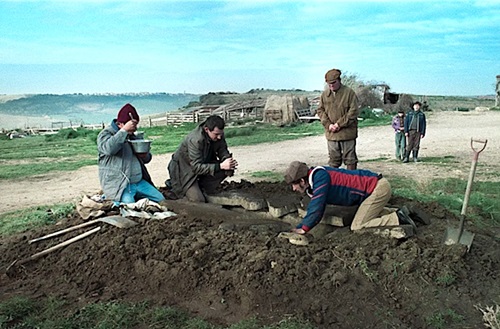
Gradually it emerges that Arthur, a former archaeologist, knows these people as accomplices in an illegal trade of Etruscan artifacts that he helps to recover and appraise, and that he’s returning to their town after a stint in jail. If Arthur is more outwardly surly than his compatriots, they prove just as cynical as him when it comes to the subject of looting artifacts. The locals defend the unearthing and trade of those relics by noting that the Etruscans are long dead anyway, and as such the notion of theft becomes an abstract principle.
He immediately falls back into his old “tombarolo” habits. Though Rohrwacher sometimes films these raids in the knockabout fast-motion of a one-reeler silent, Arthur is worn-down and heartsick, as frayed as the cuffs of his ever-dirtier suit. Despite the unqualified faith of his gang, and the troubadour who sings songs about him like he’s a folk hero, every new find seems to take more out of him, leaving him stubbly and surly and scowling. There is no question that O’Connor’s performance makes such an improbable character feel real.
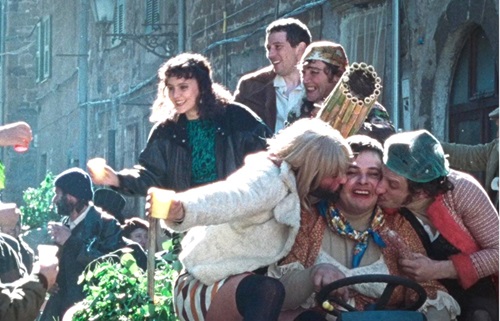
Only in Flora’s delighted presence does he relax and smile – “Arthur, my only friend!” she calls him – perhaps because, while he’s lying to her about her daughter Benjamina’s fate, he can lie to himself too. But it’s also at Flora’s that he meets Italia (Carol Duarte), Flora’s “tone-deaf” singing student, who is daffy and sexy in her own way. Italia reminds Arthur of the pleasures of life and living in the present, despite the downward lure of dreams and visions in which Benjamina red dress unravels and the dead ask him for all their stuff back.
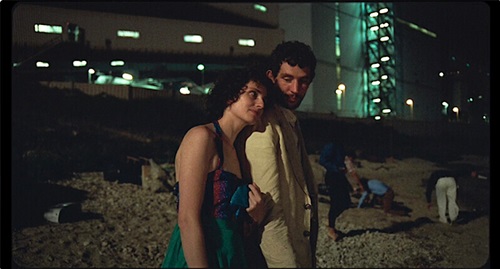
Watching La Chimera is like being lulled into an ancient magical ritual and we are cast under its spell. Arthur is the protagonist and his gradual awakening to the fact that his lifestyle is built on a desecration of the very things he loves, gives the film its structure. But Rohrwacher’s real story here is the story of the Tuscan ground and the beautiful secrets that sleep beneath our feet. La Chimerais the flipside of Rohrwacher’s previous film Happy as Lazzaro (2018). That film played on the “ignorance is bliss” adage by following an innocent farmer whose lack of engagement with the world made him immune to time’s ravages. In La Chimera, the importance of time is seemingly felt by everyone, suggesting a great sinkhole beneath the feet of the film’s characters, who make note of the fact that even as they justify their looting as reclamation from an extinct people that one day they, too, may be looted by the civilization that takes their place.
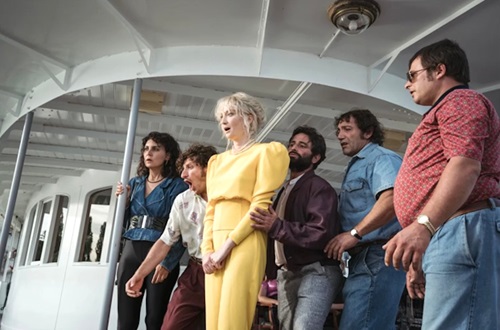
In one transcendent scene, knowingly modeled on the catacomb scene from Fellini’s Roma (1972), Arthur discovers his biggest find yet buried incongruously in the shadow of a massive power plant. It is a long-forgotten shrine that has lain undisturbed in glimmering blackness for millennia. Before Arthur and his raiders of the lost dark enter from above, Rohrwacher breaks a rule: She grants us a privileged look inside, at the silent grace of its white marble statue, at the humble votive offerings left by the pre-Christian devout and at the brightly painted frescoes of birds and animals that adorn the walls. The moment the gang breaks through, a rush of air steals the color from the murals. Not even Arthur has seen what we have, though he implicitly understands the tragic paradox. So many inestimable treasures that we look upon with awe have lost half their beauty to the look.
Rohrwacher is fascinated by the ransacked archaeology of Arthur’s psyche. He simultaneously worships history, preserving a little cache of artefacts of no value to anyone but himself, while also destroying it for money. So perhaps the only perfectly ironic ending is for him to become a part of history. Through the songs being sung about his exploits. Through the way his story grows within the crevices of Italy’s long, complex past.
La Chimera itself, a joyous, masterful work of folk magic ends up as a tragic buried shrine from the past. This philosophical quandary leads to other musings on the transience of civilization, as the modern-day Italians cannot fathom the Etruscan custom of burying one’s objects compared to the demonstrative displays of their own cultural achievements stretching from Renaissance art all the way back to the still-standing structures of ancient Rome.





